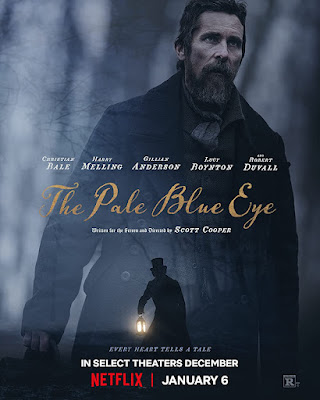Despite his frail, dissolute image, Edgar Allan Poe fared rather well as an Army enlisted man, rising to the rank of Sergeant Major. Rather unconventionally, his success as a soldier convinced his patron to secure Poe an appointment to West Point, where he effectively started over, as the Academy’s oldest cadet. He is now probably the most celebrated cadet to be court martialed and expelled. As this films starts, Poe has not yet completely sabotaged his officer prospects, but he is happy to assist Det. Augustus Landor’s investigation, at the expense of his studies in Scott Cooper’s The Pale Blue Eye, which premieres Friday on Netflix.
Remember, Poe’s reputation as a drunken basket case is largely the result of a slanderous biography, written by his greatest literary rival, Rufus Wilmot. However, all objective sources agree Poe did not thrive under the Academy’s discipline. The cadet found strung-up in a noose presumably had it worse. It certainly looks suspicious, especially when the body is subsequently mutilated in a ritualistic manner, so the Superintendent (a position that would be held by Robert E. Lee and William Westmoreland) recruits retired New York City Det. Landor to investigate death, which becomes the first of several violent crimes.
Despite Poe’s poetic soliloquys, Landor recognizes the cadet’s intelligence, so he recruits him to be his eyes and ears. Eager to help cast an unflattering light on the military academy, Poe immediately accepts. However, as Poe ingratiates himself with the dead cadet’s social circle, largely through heavy drinking, he falls for Lea Marquis, the sister of the Academy’s alpha cadet and the daughter of West Point’s physician, the questionably competent Dr. Daniel Marquis.
Essentially, Pale Blue Eye is a mystery, but Cooper’s adaptation of Louis Bayard’s source novel cleverly incorporates elements of gothic horror and the occult. Yet, the final revelation sequence rivals the conclusions of some of the best Agatha Christie films.
Compared to William Mosley in Raven’s Hollow and John Cusack in The Raven, Harry Melling might be the most Poe-looking movie Poe yet. Melling still portrays Poe as a bit of mess, but a romantic, romanticizing mess, rather than non-functional Wilmot-suggested mess. However, Christian Bale is even more compelling as the grizzled and tormented Landor. He slow burns like nobody’s business. Plus, Toby Jones is appropriately squirrelly and off-puttingly nebbish as Dr. Marquis and Timothy Spall is suitably gruff as Superintendent Player.
Cooper called in a lot of favors during casting, but the great Robert Duvall and Charlotte Gainsbourg are grossly under-utilized in basically extended cameos as Jean-Pepe, an expert in the occult and Patsy, a barmaid. As you might have heard, John Fetterman also appears briefly as a non-verbal rustic. Apparently, that is how Cooper sees the Senator.
Unlike, Raven’s Hollow or The Raven, there is not a great deal of Poe story hat-tips or Easter eggs. However, it presents young-ish Poe in a reasonably sympathetic and faithful manner. Cooper takes us to plenty of atmospheric grave yards and Gothic Revival buildings, creating a consistently eerie and mysterious vibe, even though the 128-minute running time could be trimmed a bit (particularly during the first act). Regardless, it a smart mix of mystery and gothic genres with an iconic figure like Poe and an iconic location in West Point. Enthusiastically recommended for Poe fans, The Pale Blue Eye starts streaming Friday (1/6) on Netflix.

